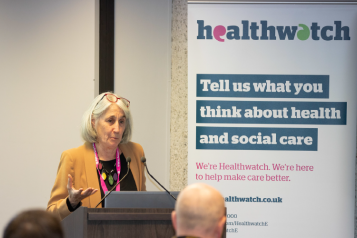Eating Disorder Awareness Week: 1–7 March

Eating disorders and the pandemic
While it is tricky to separate most things from the effects of the current pandemic, eating disorders are particularly relevant at this time. Feelings of anxiety, uncertainty about the future, and social isolation create an environment that is highly conducive to their development.
Various studies into the effects of lockdown on eating disorders have supported that theory, one 2021 publication found that 83% of sufferers reported a worsening of symptoms. When everything else is spiralling, the ability to manage what one consumes, what the scales and mirrors show, or how much one exercises can establish a highly coveted feeling of control. This is a sparse commodity under such circumstances, and a common but not ever-present theme among this broad group of mental illnesses.
Types of eating disorders
Estimates put the prevalence of eating disorders in the UK at 1.25 million people, that equates to around 1 in every 50 people. Thankfully they are not so mysterious as they once were, popular culture has familiarised us with anorexia nervosa – characterised by low weight, fear of weight gain, and a distorted perspective of oneself.
Most of us know something about bulimia nervosa – diagnosed following regular episodes of binge eating, loss of eating control, and compensatory behaviours like purging, laxative use, or excessive exercise. A lesser-known condition, avoidant restrictive food intake disorder (ARFID) is characterised by the consumption of a very narrow range of foods. For diagnosis to be made it must lead to either tube feeding, extreme social difficulties, nutritional deficiencies, or significant weight loss.
Binge eating disorder
The focus of eating disorder awareness week 2021 is to increase our understanding of binge eating disorder – characterised by consuming unusually large amounts of food quickly, loss of eating control, and accompanying feelings of discomfort, disgust, guilt, sadness, or embarrassment.
We might all overindulge from time to time, there is certainly a continuum of disorderliness, and very few of us have entirely ‘normal’ food habits. For that reason, binge eating disorder is only diagnosed when such episodes occur on at least a weekly basis for a duration of three months. The mental distress that results from the behaviour is also a key factor in diagnosis, these conditions are about moods, not foods.
OSFED
Finally, other specified feeding or eating disorder (OSFED), is essentially an umbrella term used to describe a serious combination of symptoms that do not fit into the box of the other conditions.
For example, somebody may present with certain symptoms of anorexia, bulimia, and ARFID, but not fully match the criteria for diagnosis of any of them. OSFED should certainly not be dismissed as the unimportant extra one though, it accounts for 47% of all eating disorders in the UK.
Distorted self-perspective
The following quote from Wintergirls by Laurie Halse Anderson seems to capture the essence of a distorted self-perspective that can be felt during such conditions:
"I lift my arm out of the water. It’s a log. Put it back under and it blows up even bigger. People see the log and call it a twig. They yell at me because I can’t see what they see. Nobody can explain to me why my eyes work different than theirs. Nobody can make it stop."
Eating disorders are typically viewed as an exclusively female issue and accordingly the book is about a girl with anorexia and other mental struggles.
Men and eating disorders
According to Beat however, up to 25% of people diagnosed with anorexia or bulimia are male, and the figure rises to 40% for people diagnosed with binge eating disorder.
Men are also generally less inclined to seek timely medical help, and the fact that eating disorders are seen as feminine only exacerbates that obstacle. As a consequence, the existing diagnoses are likely to be just the tip of the iceberg. Fortunately, the Beat website also contains a wealth of information specifically directed at blokes or those who are concerned about them!
Andrew ‘Freddie’ Flintoff
In an admirable step to bat away the stigma, former England cricket captain and current TV presenter Andrew ‘Freddie’ Flintoff recently publicised his own 20-year struggle during a BBC documentary entitled Living with Bulimia.
The documentary features medical experts, other men with eating disorders, and Flintoff himself talking very candidly about his journey: from being ridiculed about his weight in the media, to powerful, personal accounts that detail the realities of the condition. Flintoff’s tussle with bulimia seemed to be ultimately triggered by external factors, but the manifestation of eating disorders is commonly complex, with a combination of elements that may have little or nothing to do with food.
Causes of eating disorders
As with many complicated mental health conditions, much research is still ongoing, but the cause of eating disorders is likely to be bio-psycho-social in nature. That is: biological – relating to the genetic predisposition for certain traits; psychological – relating to low self-esteem, perfectionism, and coping strategies; and sociocultural – relating to social circumstances and present cultural standards. Although already complex, this is still a gross simplification of a wide range of disorders, each with its own nuances and varied expression between individuals. It also demonstrates why many sufferers need to reach out for professional help to be able to unravel the intertwined roots of their illness.
Help is out there – Beat and Dorset Mind
That said, once again the Beat website offers an incredible hub of non-medical social support in the form of helplines, online chat groups and so much more.
Alternatively, Dorset Mind is a local organisation that provides a range of support services related to eating disorders including a free 45-minute initial assessment and an eight-week cognitive behavioural therapy programme with trained mentors.
The take home message is that you have probably met somebody affected by eating disorders, and now more than ever we need to be vigilant and aware of the signs. They can cause real mental and physical scarring, and guys: they’re not just for girls! Fortunately, there has also never been a better time to seek out the abundance of high-quality information and support that is out there.
We thank Richie for his contribution of this article for Eating Disorder Awareness Week. If you would like to get in touch with Richie for further information you can contact him directly on X @Nutrichie1.
If you wish to share your own experience contact contact us or complete our online feedback form


